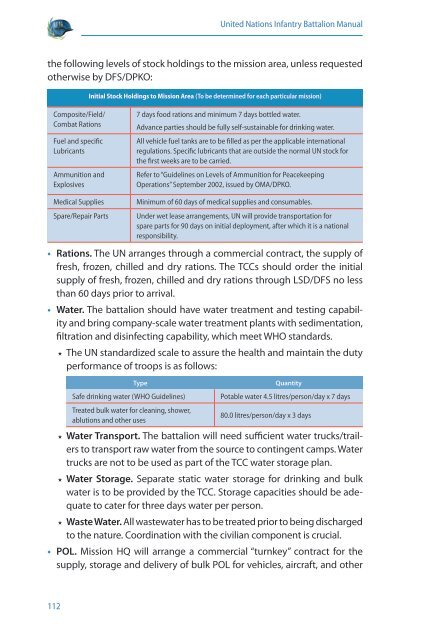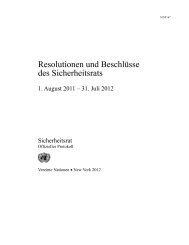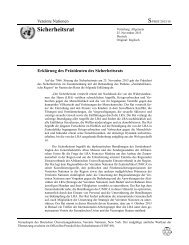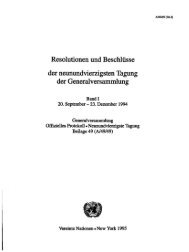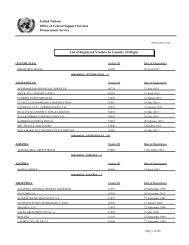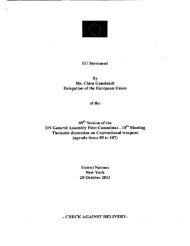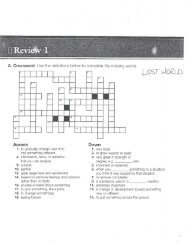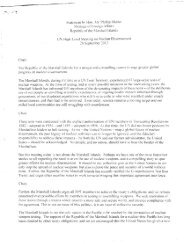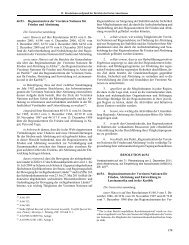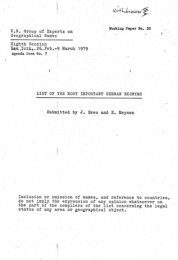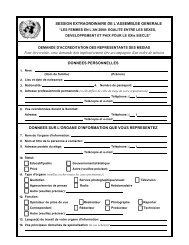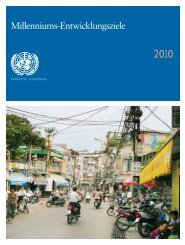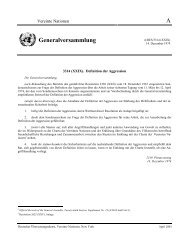United Nations Infantry Battalion Manual - the United Nations
United Nations Infantry Battalion Manual - the United Nations
United Nations Infantry Battalion Manual - the United Nations
You also want an ePaper? Increase the reach of your titles
YUMPU automatically turns print PDFs into web optimized ePapers that Google loves.
112<br />
<strong>United</strong> <strong>Nations</strong> <strong>Infantry</strong> <strong>Battalion</strong> <strong>Manual</strong><br />
<strong>the</strong> following levels of stock holdings to <strong>the</strong> mission area, unless requested<br />
o<strong>the</strong>rwise by DFS/DPKO:<br />
composite/field/<br />
combat rations<br />
fuel and specific<br />
lubricants<br />
ammunition and<br />
explosives<br />
Initial Stock Holdings to Mission Area (To be determined for each particular mission)<br />
7 days food rations and minimum 7 days bottled water.<br />
advance parties should be fully self-sustainable for drinking water.<br />
all vehicle fuel tanks are to be filled as per <strong>the</strong> applicable international<br />
regulations. specific lubricants that are outside <strong>the</strong> normal un stock for<br />
<strong>the</strong> first weeks are to be carried.<br />
refer to “guidelines on levels of ammunition for peacekeeping<br />
operations” september 2002, issued by oma/Dpko.<br />
medical supplies minimum of 60 days of medical supplies and consumables.<br />
spare/repair parts under wet lease arrangements, un will provide transportation for<br />
spare parts for 90 days on initial deployment, after which it is a national<br />
responsibility.<br />
• Rations. The UN arranges through a commercial contract, <strong>the</strong> supply of<br />
fresh, frozen, chilled and dry rations. The TCCs should order <strong>the</strong> initial<br />
supply of fresh, frozen, chilled and dry rations through LSD/DFS no less<br />
than 60 days prior to arrival.<br />
• Water. The battalion should have water treatment and testing capability<br />
and bring company-scale water treatment plants with sedimentation,<br />
filtration and disinfecting capability, which meet WHO stand ards.<br />
The UN stand ardized scale to assure <strong>the</strong> health and maintain <strong>the</strong> duty<br />
performance of troops is as follows:<br />
Type Quantity<br />
safe drinking water (WHo guidelines) potable water 4.5 litres/person/day x 7 days<br />
treated bulk water for cleaning, shower,<br />
ablutions and o<strong>the</strong>r uses<br />
80.0 litres/person/day x 3 days<br />
Water Transport. The battalion will need sufficient water trucks/trailers<br />
to transport raw water from <strong>the</strong> source to contingent camps. Water<br />
trucks are not to be used as part of <strong>the</strong> TCC water storage plan.<br />
Water Storage. Separate static water storage for drinking and bulk<br />
water is to be provided by <strong>the</strong> TCC. Storage capacities should be adequate<br />
to cater for three days water per person.<br />
Waste Water. All wastewater has to be treated prior to being discharged<br />
to <strong>the</strong> nature. Coordination with <strong>the</strong> civilian component is crucial.<br />
• POL. Mission HQ will arrange a commercial “turnkey” contract for <strong>the</strong><br />
supply, storage and delivery of bulk POL for vehicles, aircraft, and o<strong>the</strong>r


